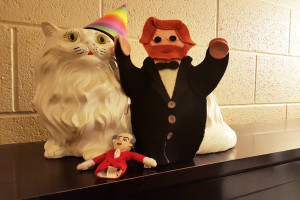One professor uses puppets to motivate his students and make his class more memorable.
Dr. David Easley, associate professor of music theory, lends “Verdi” and “Mozart,” puppets to students as a motivational prize and also uses them in some class lessons.
The Verdi puppet is based on the Italian opera composer Giuseppe Verdi.

“I wish there was some like elaborate, planned out story about how I decided I was going to use them to motivate everyone,” Easley said. “I think they just kind of happened. One day before a class I thought ‘oh, I’m just going to take that hand puppet in because it’d be weird and funny’ and it was definitely weird, and they laughed, so I assumed it was funny.”
After that, Verdi started talking to students in Italian and stuck around, Easley said.
“There’s no way for me to talk about this without sounding crazy,” he said. “I’m just glad it’s not creepy yet.”
The puppets weren’t given out to students until last year, and Easley said that was planned. He teaches mostly freshmen music theory and aural skills five days a week. He said half way through the semester, it gets tough, so Verdi was used to increase motivation.
“I gave him away as a prize one day. I said ‘oh, you can take Verdi on an adventure,’” Easley said.
Madeline Dannenberg, music theater sophomore, was the first student to take Verdi on an adventure.
“I took Verdi everywhere,” Dannenberg said. “He saw the Hall of Queens, the Chickasaw Warrior statue, my Acting II class, and the caf, among other places.”
Verdi was given to Easley by his girlfriend, who became his wife. She bought the puppet from New York in 2005 because Easley’s two areas of research focus on popular music, such as pop rock and thrash metal, and 19th Century opera with an emphasis on Verdi.
“Mozart” is a finger puppet based on the composer Wolfgang Amadeus Mozart that a student gave Easley last year.
Both puppets give students a reason to think and talk about music theory outside the classroom, making the class more memorable, Easley said.
“Seeing them five days a week, you’d think they think about our class enough already as it is,” he said. “But anytime I can get them to think about our class, I hope that will spark a memory of what we did in class, and I think that’s really what will help students learn.
“Not doing a homework assignment, not doing a test, but really thinking about things they learned. It’s creating that memory and helps them remember my class in a positive way.”
Dannenberg agreed the puppets help students.
“Some of the composers we learn about lived hundreds of years before us and so it can be hard to remember that they were actual people,” she said. “The puppets sparked interest in the composers themselves rather than only focusing on their music.
“I always remembered the concept better during quizzes because I could associate the concept with whatever he did with the puppet.”


Leave a Reply